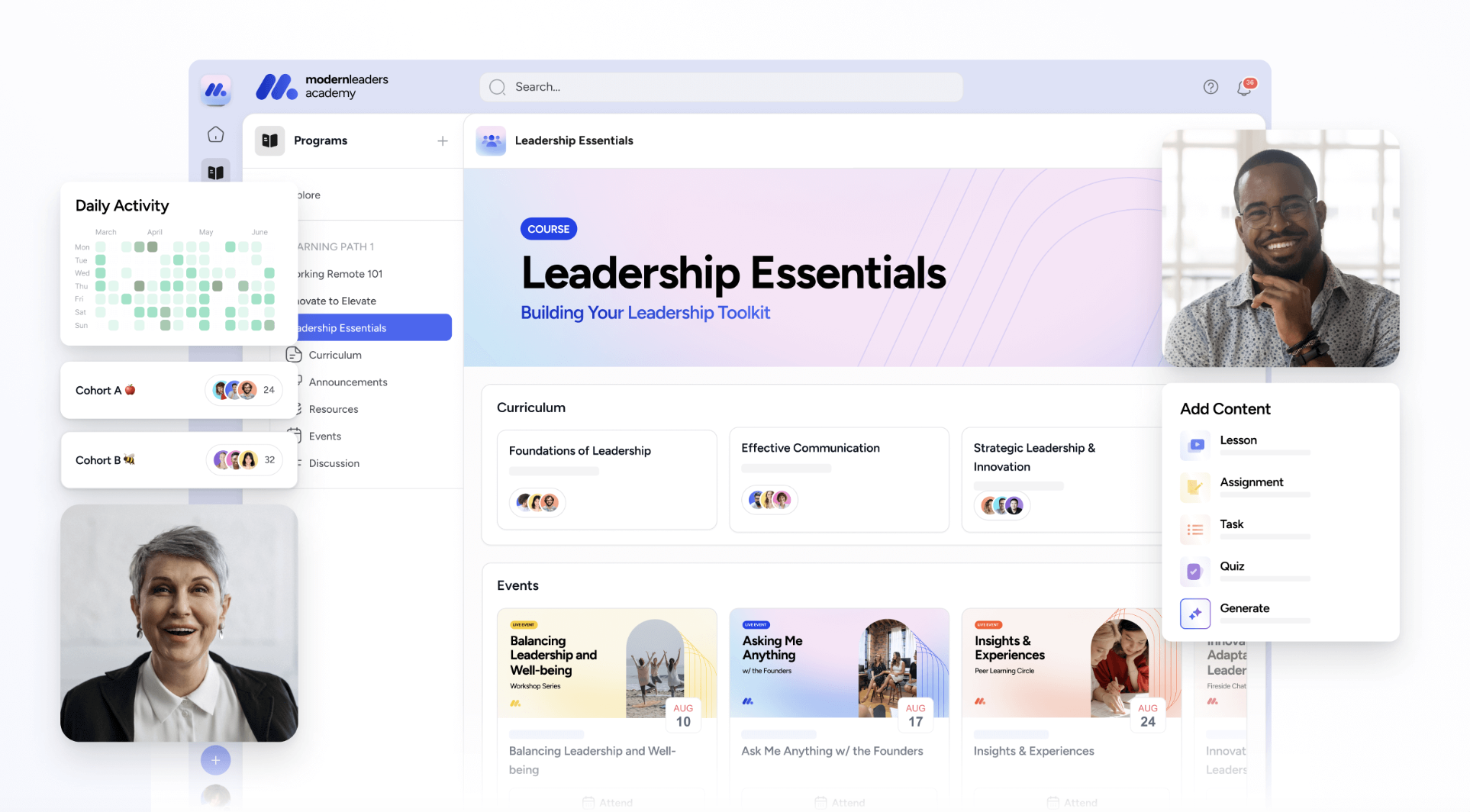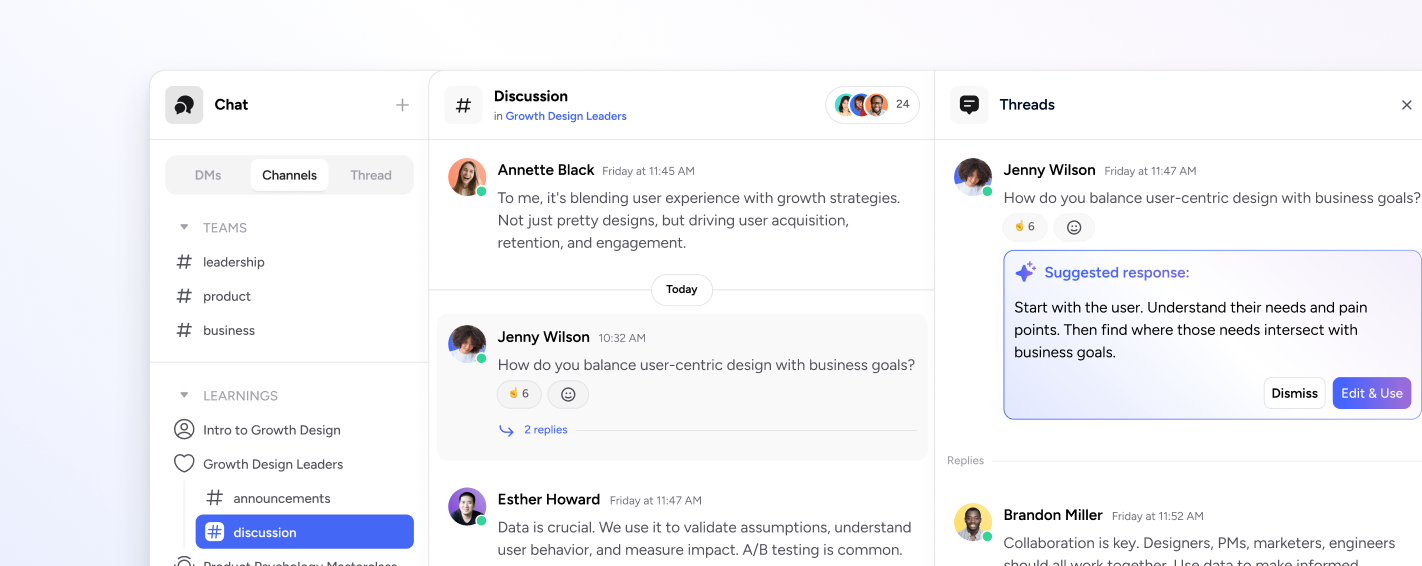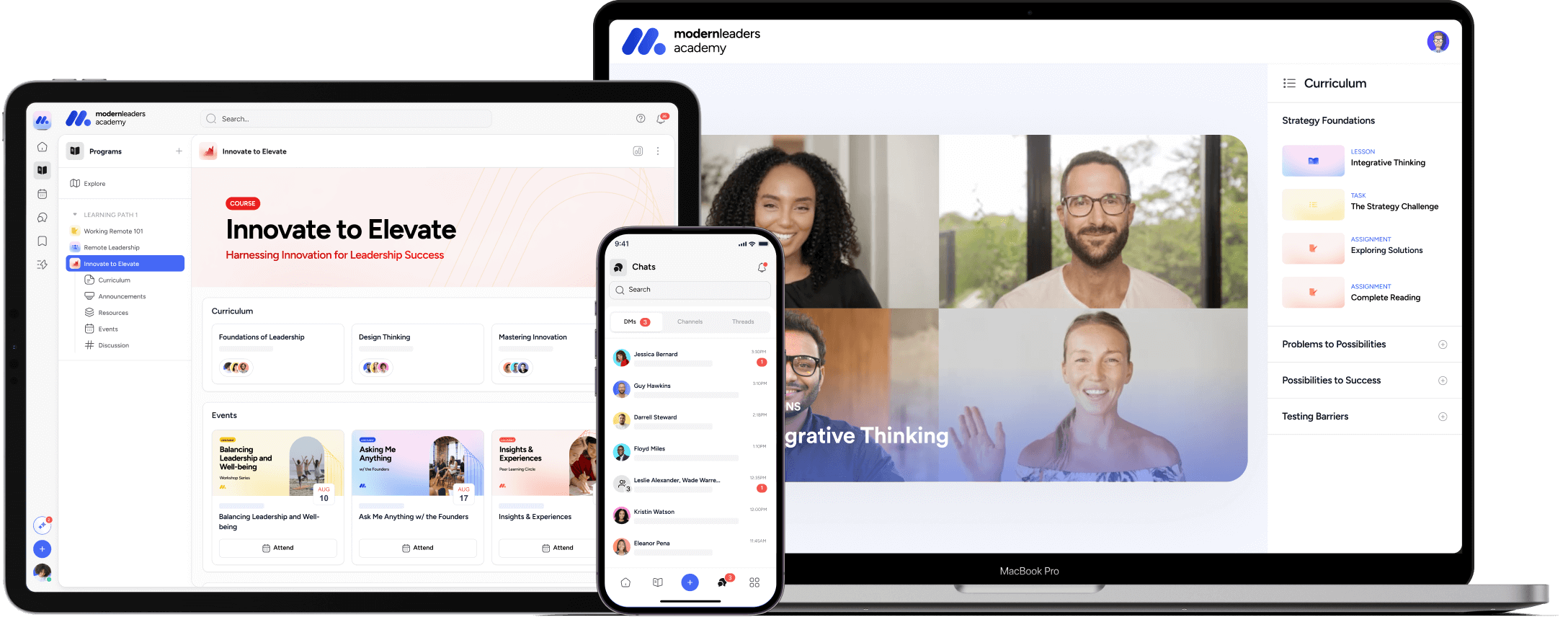Cohort Leadership Programs: The New Model in Leadership Development (2026)

TL;DR
- What it enables: Develops leadership skills through collaborative group learning and peer-to-peer knowledge sharing experiences
- What it includes: Structured curricula, peer coaching, mentorship, real-world projects, and supportive learning environments
- Key elements: Clear learning pathways, practical application opportunities, ongoing feedback mechanisms, and alumni networks
- Top steps for 2026 include: Define objectives, create blended curriculum, establish collaboration spaces, pilot test
- Why it matters: Creates lasting professional networks and develops adaptable leaders prepared for modern business challenges
What is a Cohort Leadership Program?
A Cohort Leadership Program represents a synergistic approach to leadership development, uniting a handpicked group of promising individuals, often executives to mid-level managers or employees with high potential, to progress through leadership training as a collective entity.

Embracing the cohort-based course model, these programs facilitate a shared educational journey, enabling participants to learn from each other's experiences and insights. This collaborative voyage is marked by a fusion of interactive instructional sessions, practical hands-on projects, reciprocal peer learning, and insightful mentorship.
At the core of the cohort leadership development programs lies the commitment to instill leadership principles that participants can apply within the tapestry of their professional roles, ensuring that every stride in learning translates into tangible outcomes in the workplace.
In addition, these are run by cohort-based learning programs and are more than just a series of group sessions; they’re a dynamic learning ecosystem tailored to diverse learning styles and preferences. They’re about:
- Staying the course
- Maintaining motivation
- Fostering long-term development
- Building professional connections that transcend the confines of the program.
These programs are carefully tailored to organizational goals, so the leadership skills developed go beyond theory and become key drivers for the organization’s progress.
Traditional Leadership Programs vs Cohort Leadership Programs
Traditional leadership development programs are often characterized by a linear, individualistic approach to learning, where participants absorb knowledge through a series of lectures, case studies, and individual assignments.
These programs usually focus on the development of individual skills and competencies, with less emphasis on group interaction or collaborative learning experiences.
In contrast, cohort leadership programs take a communal approach to development. Participants journey together through the curriculum, leveraging the collective wisdom and diverse experiences of the group.
This collaborative learning environment fosters a sense of camaraderie and shared purpose that is less prevalent in traditional programs. However, both styles of programs aim to enhance the leadership pipeline and can be effective in different contexts. The choice between the two often depends on the specific goals and culture of the organization.
Key Components of Effective Cohort Leadership Programs
At the heart of these transformative experiences is the key component that collectively forms the backbone of effective cohort-based programs. These elements are not chosen at random; they are the pillars that support the development of leadership skills that resonate both within and beyond the confines of the organization.

Next, we’ll explore the elements of structured learning pathways, peer coaching, supportive environments, and the significance of practical application through real-world scenarios.
Structured Learning Pathways
The journey through a cohort leadership development program is akin to navigating a well-charted map, with structured learning pathways providing a clear progression of skills and knowledge. Facilitators set the stage for success, defining objectives that keep participants focused and moving forward.
This blend of facilitated and self-directed learning ensures that every cohort participant is both a learner and a contributor, engaging with the material in a manner that resonates with their unique needs and learning style.
Peer Coaching and Supportive Environment
The synergy of peer coaching within a cohort cannot be overstated. It’s where the ‘wisdom of the crowd’ truly shines, enhancing learning and accelerating development. In this nurturing space, ongoing support is given, establishing a foundation of trust and accountability that bolsters both individual and collective success.
As participants engage, collaborate, and share insights, they not only reinforce new concepts but also forge connections that extend well beyond the program’s duration.
Practical Application and Real-World Scenarios
Cohort leadership programs transcend theory; they serve as a practical platform for real-world application. Case studies, simulations, and action-based learning projects encourage participants to apply theory, honing skills that can be immediately implemented in their workplace.
These practical elements are designed not only to challenge but also to instill a sense of confidence and capability, as established leaders navigate complex business intersections and learn to utilize a variety of leadership styles.
Here's How to Build an End-to-End Cohort Leadership Program
In today's rapidly evolving business landscape, the importance of cohesive and adaptive leadership cannot be overstated. Cohort-based learning has emerged as a powerful modality to cultivate these leadership qualities.
By leveraging the collective intelligence and diverse perspectives of a group, cohort-based learning fosters an environment where leaders can grow together, challenge each other, and build a strong network of support.
Building a Cohort Leadership Program is a strategic process that involves careful planning and execution. Here are the steps to create an effective program:

Step #1. Define the Scope and Learning Objectives
Begin by pinpointing the core leadership skills and techniques that are most pertinent for your cohort leaders. Delve into specific topics such as:
- effective communication,
- conflict resolution,
- team dynamics, and
- leadership ethics to ensure a comprehensive curriculum.
Establish clear, measurable goals for what participants should be able to achieve by the end of the program, such as leading a team effectively, handling conflicts within a group, or developing innovative strategies for community engagement. This step lays the groundwork for a focused and results-driven program.
If you're struggling to generate ideas, consider soliciting feedback from your cohort leaders and evaluating their skills to identify areas where they could improve or need assistance. Gather their input and facilitate an open discussion to ensure that the program aligns with their development needs.
You may start asking the cohort with polls and survey questions. Here's how you can do it:
- Go to Admin -> Content -> Surveys.
- Click on the Add Survey, fill out the necessary information, and then click on the 'set-up questions.'
- Choose 'rating', type your question, and click 'save'.
- All done! You can go now to your #channel board and then add a survey to your post.
Step #2: Generate a Curriculum Tailored for Blended Learning
Develop a curriculum that is meticulously structured into distinct, progressive modules, with each one building on the knowledge and skills acquired in the previous. This methodical approach ensures a holistic grasp of leadership within a cohort context.
Integrate a diverse array of learning materials, including videos, articles, interactive webinars, and experiential exercises, to cater to different learning styles and cement the leadership concepts being taught.
Incorporate elements of blended learning, combining asynchronous and synchronous learning to provide flexibility and encourage the practical application of skills in real-world scenarios. By doing so, the curriculum supports leaders in integrating their newfound knowledge directly into their day-to-day professional activities.
To achieve this, begin by developing a learning product using a social learning platform. Opt for a Learning Management System (LMS) that facilitates collaborative activities among students, such as the Disco learning platform, rather than a traditional LMS. This approach will significantly enhance the 'cohort-based learning strategy' within your product.
Creating the first draft of your curriculum has never been easier! With Disco AI, you can generate a full, structured curriculum in just a few minutes. Once the AI completes the draft, you can refine it to add your insights and give it a more human touch, ensuring it reflects your unique perspective.
Experience how Disco AI generates an entire curriculum in seconds:
Reminder: Make sure you have a Disco account to generate the initial draft of your curriculum! Disco is offering a 14-day free trial that you can leverage.
Step #3. Set up a Collaborative Learning Environment
The curriculum isn't enough. Cohort leadership programs work effectively compared to traditional because these are learning with peers. Creating a collaborative learning environment is a must, therefore, identifying collaborative strategies such as engaging in discussion forums, peer learning, group sessions, and coaching sessions are a must.

Implementing this becomes effortless with the Disco! You can customize your homepage using blocks and design community spaces featuring leadership courses, as well as channels for your cohort leaders. We've successfully implemented a similar setup in our Modern Leaders Academy. Here is a brief tutorial on how we achieved this:
Step #4. Pilot Test
First, initiate with a select group. Carefully select a representative sample from your cohort leaders to participate in the pilot phase. This strategy ensures that a diverse array of insights and experiences contribute to the program's development.
Next is to gather comprehensive feedback. Implement a variety of feedback mechanisms, such as surveys, interactive discussion forums, and one-on-one conversations, to thoroughly capture the nuances of the participants' experiences and identify areas for improvement.
With Disco, you can effortlessly solicit feedback from learners at the end of each module by incorporating a 'feedback' task. Don't forget to set up the submission visibility into 'managers only' and make the submission format mandatory.

Additionally, if you're organizing a live session during your pilot test, you can enable event feedback, and the system will automatically request attendees' input regarding the event. The collected data will be readily accessible in the 'Feedback' section within your event.

Plus, here's how you can integrate an event into your course using the Disco platform.
Step #5. Officially Launch and Ongoing Evaluation
With the valuable insights gathered from the pilot phase, it's time to officially roll out the program to a broader audience within your organization. This marks the beginning of an exciting new chapter in leadership development.
But the work doesn't stop there—maintain a commitment to excellence by engaging in ongoing evaluation. Regularly refresh and fine-tune the course content to reflect the latest developments in the leadership domain, incorporate participant feedback, and ensure the program remains at the forefront of educational effectiveness.
By integrating these steps into your process, you're not just launching a program; you're nurturing a living, evolving ecosystem of leadership excellence that continues to grow and adapt in service of organizational success.
Step #6: Sustain Continuous Learning Post-Program Through Alumni Spaces
To ensure the momentum of growth continues beyond the structured confines of the Cohort Leadership Program, it's essential to implement strategies that sustain continuous learning. This can be achieved through the establishment of robust alumni networks, which serve as a personal 'board of directors' for each member.
These networks are instrumental in providing ongoing feedback, support, and encouragement, fostering a culture of lifelong learning. As participants graduate from the program, they become part of an exclusive community where they can continue to share insights, challenge each other, and access resources that contribute to their long-term professional development.
Encouraging alumni to stay connected and actively engage with the network ensures that the relationships and knowledge gained during the program continue to enrich their careers and personal growth. This ongoing engagement is not only beneficial for the individual leaders but also for the organization, as it leads to a perpetually evolving leadership skill set within its ranks.
To achieve this, you can utilize our automation feature to seamlessly transition participants who complete the modules into the alumni group. This ensures a smooth progression and fosters ongoing engagement within the community. Here's a detailed guide on how to set up this automation:
Elevate Leadership Training with DISCO: The #1 AI-powered Cohort-based Learning Platform for Leadership Development Programs
In the realm of leadership development, the emergence of DISCO as the leading cohort-based learning platform is a game-changer. Renowned for its unparalleled ability to blend learning with community-building, Disco has become the go-to resource for the world's most prestigious leadership upskilling programs and corporate training initiatives.
Leveraged by learning organizations for up-skilling, customer enablement, partner training, cohort learning programs, and accelerators, Disco's AI-powered platform makes collaborative learning exceptionally engaging and simple to manage.

Backed by GSV, a leading investor in edtech, and recognized as Fast Company's Most Innovative Edtech of the Year and Edtech Breakthrough's Startup of the Year, Disco's client list includes the Toronto Board of Trade, Kaplan, Coursehero, MonitorDeloitte, XPrize, Baptist Health, among others.

Its innovative approach creates a powerful synergy between educational content and social interaction, making it the preferred choice for organizations aiming to foster adaptable leadership skills and forge lasting professional connections.
Disco is not merely a platform; it's an investment in the present and a strategic tool for carving out a path to future success. By equipping leaders with the necessary tools, insights, and networks, Disco ensures they are well-prepared to tackle the complexities of the modern business landscape.
Build your cohort leadership program with Disco: Start with a 14-day free trial! Do you have questions? Schedule a personalized demo with our expert team to familiarize yourself with the platform.











